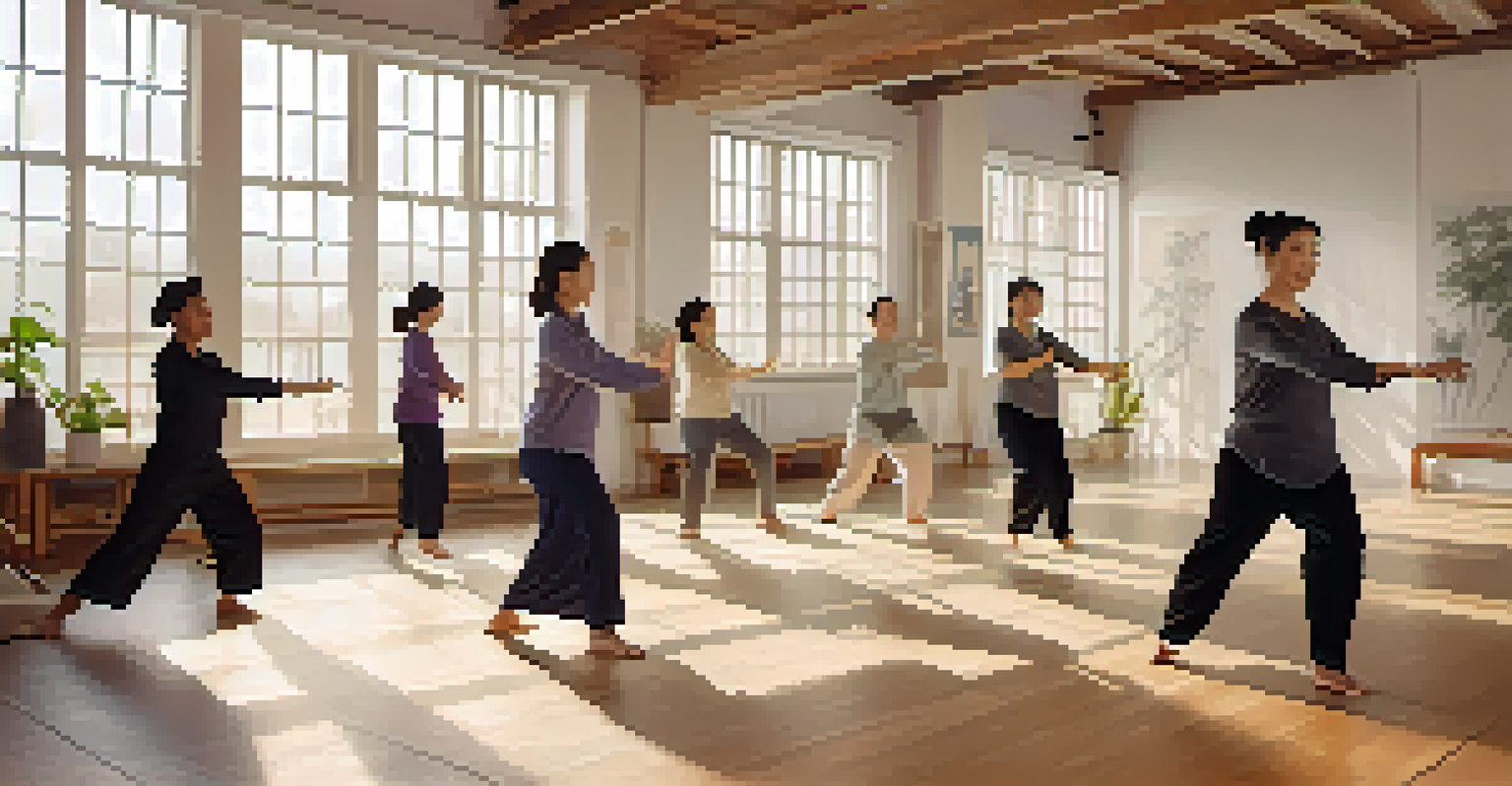The Benefits of Practicing Tai Chi for All Ages

Introduction to Tai Chi: A Gentle Art for Everyone
Tai Chi, often described as 'meditation in motion,' is a centuries-old practice rooted in Chinese martial arts. It combines slow, graceful movements with deep breathing and mindfulness, making it accessible to people of all ages and fitness levels. Whether you're a young athlete or a senior looking to improve mobility, Tai Chi offers something beneficial for everyone.
Tai Chi is a form of exercise that can lead to a healthier lifestyle, emphasizing balance, flexibility, and mindfulness.
The beauty of Tai Chi lies in its adaptability. You can practice it standing, sitting, or even while walking, allowing it to fit seamlessly into your daily routine. This flexibility means that regardless of your physical condition, there's a way to engage with Tai Chi that works for you.
As we dive deeper into the benefits of Tai Chi, you'll see how it promotes not just physical health but also mental clarity and emotional balance, making it a holistic practice that nurtures the whole person.
Improved Balance and Coordination Through Tai Chi
One of the standout benefits of practicing Tai Chi is its ability to enhance balance and coordination. The slow, deliberate movements encourage body awareness, helping practitioners to develop a stable foundation. This is especially important for older adults, as improved balance can significantly reduce the risk of falls.

For younger practitioners, Tai Chi teaches control and precision, which can complement other physical activities and sports. By fostering a sense of connection between mind and body, practitioners learn to move fluidly and gracefully, enhancing their overall physical performance.
Tai Chi Enhances Physical Balance
The slow, deliberate movements of Tai Chi improve balance and coordination, reducing fall risks, especially for older adults.
Imagine Tai Chi as a dance where every movement is intentional, promoting not just balance but also a better understanding of how your body moves in space. This understanding can lead to a greater sense of confidence in one's physical abilities.
Boosting Mental Health: The Mind-Body Connection
Tai Chi is not just a physical practice; it’s also a profound mental exercise. The focus required to execute its forms encourages mindfulness, which can significantly reduce stress and anxiety levels. This makes Tai Chi an excellent practice for anyone looking to improve their overall mental well-being.
The mind is like water. When it's turbulent, it's difficult to see. But if you allow it to settle, the answer becomes clear.
As you practice Tai Chi, you’ll find that the rhythmic movements and deep breathing create a meditative state, helping to clear your mind. This meditative quality can lead to better emotional regulation, allowing you to respond to challenges with a calm demeanor.
Think of Tai Chi as a mental reset button—each session offers a chance to unwind and reconnect with yourself, fostering a sense of peace that can carry over into your daily life.
Enhancing Flexibility and Strength Through Tai Chi
Another remarkable benefit of Tai Chi is its ability to improve flexibility and strength. The gentle stretching involved in the movements encourages the body to open up, gradually increasing your range of motion. This is particularly beneficial for older adults, who may experience stiffness in their joints.
In addition to flexibility, Tai Chi builds muscular strength, particularly in the core and lower body. Unlike high-impact workouts, Tai Chi offers a low-risk way to develop strength without straining your muscles or joints, making it suitable for everyone.
Boost Mental Health with Tai Chi
Tai Chi promotes mindfulness and reduces stress, acting as a mental reset that fosters emotional regulation.
Visualize Tai Chi as a flowing river; as it flows, it carves out the landscape, gradually creating space and strength. This natural progression is what makes Tai Chi a sustainable practice for long-term health.
Promoting Heart Health with Tai Chi Practice
Regular practice of Tai Chi has been shown to have positive effects on heart health. The gentle movements and focus on deep breathing help to lower blood pressure and improve circulation, which can be beneficial for cardiovascular health. This makes Tai Chi an excellent form of exercise for those managing heart-related issues.
Moreover, because Tai Chi is low-impact, it’s suitable for individuals of all ages, including those who might be recovering from heart surgery or dealing with chronic conditions. Practicing Tai Chi can create a safe environment for gradually improving heart health without overexertion.
Consider Tai Chi as a gentle breeze that nurtures the heart—its calming nature helps to steady the heart rate while promoting overall well-being.
Tai Chi as a Social Activity for All Generations
Practicing Tai Chi can also serve as a wonderful social activity, bringing together people of different generations. Classes often include participants from various age groups, creating a sense of community and shared experience. This social interaction can enhance motivation and enjoyment, making the practice more rewarding.
Engaging in Tai Chi with others fosters connections and friendships, which can be especially beneficial for older adults who may experience isolation. Sharing the experience of learning and growing together can enhance the joy of practice.
Tai Chi Builds Community Connections
Practicing Tai Chi together fosters social interaction and relationships across generations, enhancing the joy of the experience.
Think of Tai Chi as a bridge connecting generations—a shared activity that can spark conversations, build relationships, and create lasting memories.
Getting Started: How to Begin Your Tai Chi Journey
Starting your Tai Chi journey is easier than you might think! Many communities offer classes specifically designed for beginners, making it accessible and welcoming. You can also find instructional videos online, allowing you to practice from the comfort of your home.
As you begin, focus on the basics and be patient with yourself. Tai Chi is about progress, not perfection, so embrace the journey and enjoy each movement. Remember, it’s perfectly fine to take your time as you learn the forms.

Picture yourself stepping into a peaceful garden, ready to explore the beauty of Tai Chi. Each movement is a new discovery, inviting you to connect with your body and mind in a harmonious way.
Conclusion: Embracing the Holistic Benefits of Tai Chi
In conclusion, Tai Chi offers a wealth of benefits that can enhance physical, mental, and emotional well-being for individuals of all ages. From improved balance and flexibility to reduced stress and enhanced social connections, it’s a holistic practice that nurtures the whole person.
As you consider incorporating Tai Chi into your routine, remember that it’s never too late to start. Whether you’re young or young at heart, the rewards of this practice can be profound and life-changing.
Embrace the journey of Tai Chi, and you may just find that it leads you to a path of greater health, serenity, and connection with yourself and others.